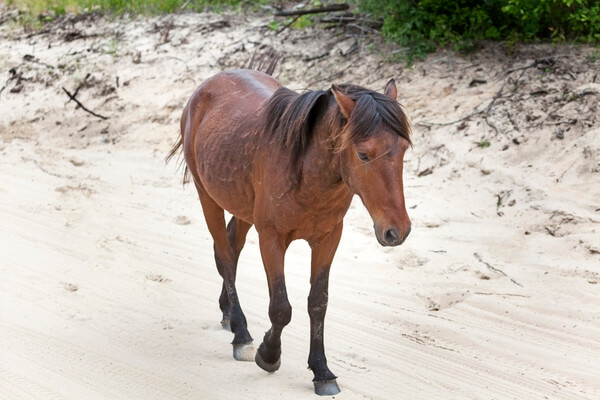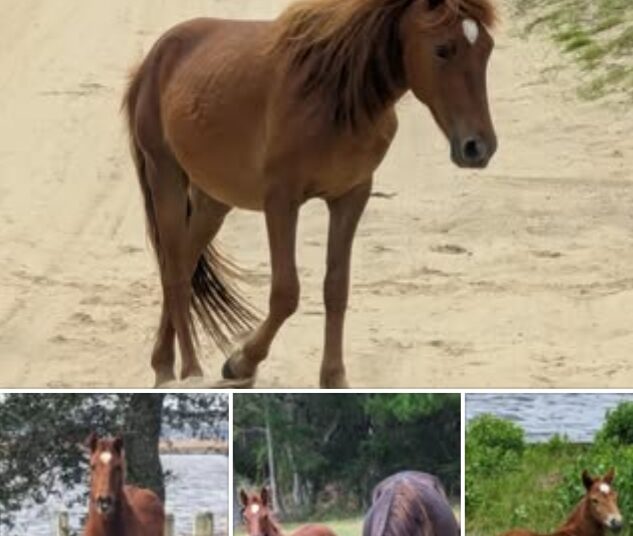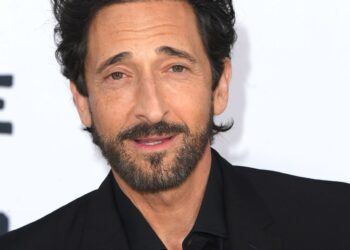A tragic incident occurred on June 15, 2023, when a 12-year-old wild mare named Caroline died during a mating ritual on the Outer Banks of North Carolina. According to the Corolla Wild Horse Fund, a nonprofit organization dedicated to preserving the Corolla wild horse herd, Caroline was aggressively chased by a stallion during the breeding season. Witnesses reported that she fell to the ground and died almost instantaneously from a broken neck. A field necropsy confirmed the cause of death, revealing no internal abnormalities, and the injury was consistent with the observed behavior
This incident highlights the inherent dangers of wild horse behavior, particularly during the breeding season when stallions are highly territorial and protective of their mares. The Corolla herd, consisting of approximately 100 free-roaming horses, is known for its aggressive interactions, including brutal fights among stallions over territory and mates. Such confrontations can result in severe injuries or fatalities, as evidenced by previous incidents where stallions sustained broken limbs during fights
In the wake of Caroline’s death, the Corolla Wild Horse Fund emphasized the unpredictability and potential danger of these wild animals, urging the public to maintain a safe distance. County regulations mandate that humans stay at least 50 feet away from the horses to prevent accidents and ensure both human and animal safety 
Despite the sorrow of Caroline’s untimely death, the Corolla Wild Horse Fund also reported the birth of a new foal, named Donner, shortly thereafter. This birth symbolizes the ongoing cycle of life within the herd, as new generations continue to emerge amidst the challenges faced by the wild horses .
The Corolla Wild Horse Fund remains committed to the conservation and management of the Corolla wild horse herd, balancing the preservation of these historic animals with the safety and education of the public. Their efforts include monitoring the herd’s health, managing breeding, and educating visitors about responsible interactions with the horses. The organization continues to advocate for the protection of these animals, ensuring that they can roam freely while minimizing human-wildlife conflicts.
In conclusion, the death of Caroline serves as a poignant reminder of the raw and untamed nature of the wild horses of the Outer Banks. While their beauty and historical significance draw many visitors, it’s crucial to approach these animals with respect and caution. By adhering to safety guidelines and supporting conservation efforts, we can help ensure that future generations will have the opportunity to witness these magnificent creatures in their natural habitat.
One of North Carolina’s beloved wild horses was discovered with a broken neck, and evidence indicates it was the result of a violent ritual on the Outer Banks. Two-year-old Donner was likely killed by a larger stallion in a battle over turf, according to the Corolla Wild Horse Fund. A tourist reported the horse’s limp body Wednesday, June 4, in the yard of a rental home near the North Swan Beach area, officials said. The community is about a 230-mile drive northeast from Raleigh. “He sustained injuries consistent with fighting with another stallion, including a broken neck,” Herd Manager Meg Puckett wrote in a Facebook post. “While it is devastating to lose a healthy, young horse from the herd, this is what it means to be wild and free. This kind of behavior may seem brutal to us, but it is a natural part of healthy herd dynamics.”
Outer Banks stallions engage in no-holds barred combat during disputes over mates or territory, experts say. Tactics include kicking, butting and biting out chunks of flesh from each other.
Donner likely came under attack when he strayed into the territory of a larger stallion, Puckett said. Wounds on the ears indicate Donner was grabbed and slung, and the force was enough to snap his neck, Puckett told McClatchy News in a phone interview. He died instantly. While brutal, “survival of the fittest is a very real and important thing” among the horses, Puckett says. “Interfering with the natural order of things can have consequences that impact the overall health and stability of the herd,” she wrote on Facebook. “This colt’s death should serve as a reminder of just how fragile life can be for these horses. They face so many natural challenges to their survival; there is no guarantee that every foal will make it to adulthood, even under the best circumstances. We can’t control nature (and we wouldn’t want to).”
Donner was buried late Wednesday by the fund, which uses donations for medical emergencies and to tend the habitat of the 110 horses that roam Corolla. The fund does not receive state or federal funding.
It will likely never be known which stallion killed Donner, who was too young to have learned how to defend himself, Puckett said. “Every death like this is hard. They are wild animals, but we know them very, very well as individuals. So you can’t help but get attached to them,” she said. “Anyone who does this work and doesn’t get attached is in the wrong line of work. You have to care and love them.”















